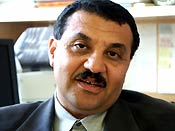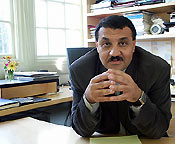|

|

|
NEWS SEARCH
|
|
|
|

|
| Middle
East 101, continued |
|
In
your opinion, do most citizens of the Middle East desire democratic
government?
That is an
important question. Prior to 9/11, nonprofit and citizens' groups
were really working very, very hard to push governments in the
direction of democracy. And some steps had been taken —
relaxing censorship of the media, allowing in television channels
and newspapers from outside the country.
| |
|
 |
'I
do not speak for Arab-Americans, or even associate myself
with being an Arab-American. I'm of Middle Eastern origin,
but I am an American. I have never accepted having my identity
hyphenated.'
—Professor Nezar AlSayyad, CMES chair |
The
problem is that after 9/11, the U.S. decided to crack down on
its own citizens, and also on Arab citizens coming to this country.
In the Middle East, this has enabled the fundamentalist forces
and the more repressive government forces to say, look, the
U.S. is doing it, so why can't we? The other thing we're seeing
in the Middle East is that people are starting to question whether
democracy is the best form of government for cultures and societies
that have always privileged tradition and group affiliation
over individual association or belief.
This is one of the greatest losses that occurred as a result
of September 11: the regression of the opposition. Now there
are fewer people in the Middle East willing to fight to establish
democratic institutions than there were before September 11,
either because they have become disillusioned with democracy,
or because of the overall retreat to a more traditional system.
Here is the problem: the more that we in the United States start
talking about ourselves as "us" versus "them,"
then the people referred to as "them" become very
aware of being different. I think the fact that we have so many
people out there, mainly in the Muslim Middle East, who see
themselves as fundamentally different from us is very, very
dangerous. We cannot communicate equally; there's a wall between
us.
However, I do not speak for Arab-Americans, or even associate
myself with being an Arab-American. I'm of Middle Eastern origin,
but I am an American. I have never accepted having my identity
hyphenated. In fact I was not aware that people thought of me
as an Arab-American until 9/11, when suddenly I was asked questions
like, "As an Arab-American, how do you feel about…"
I am American. And that's all.
Arab states condemn the government
of Saddam Hussein as cruel and unethical. Yet they also oppose
a potential U.S. attack against Saddam Hussein. Why, when there
is such great diversity among Middle Eastern governments and
among their relationships to the U.S., do you think that they
are united on this point?
It's very simple. If they agree that the U.S.
can remove any government in the Arab world, then their own
government could be next.
The other reason has to do with Arab pride. Despite all the
differences between the Arab states, they all still believe
in a sort of pan-Arabist ideal. Yes, maybe it is an old idea;
it goes back to the 1950s and the dream of Abdel Nasser, the
late president of Egypt, to create a United Arab States. That
dream never really materialized, but it's enshrined in Arab
culture, part history and part myth. In a sense, the unwillingness
of the Arabs to give up this legitimate dream makes it very
difficult for them to accept a situation in which Iraq, with
no act of overt aggression on its part, can be attacked and
possibly decimated in the process.
That is what marks the difference between this moment and the
Gulf War. In 1991, with Kuwait, Iraq violated a major rule of
engagement within the Arab world: it occupied another Arab state.
You just don't do that. It was a difficult moment for so many
countries, but all of them decided to join and liberate Kuwait,
not out of sympathy for Kuwait but almost from the same concern
as now — that is, "We could be next. If Saddam Hussein
takes over Kuwait, he could take over Saudi Arabia, Bahrain,
or another Gulf state."
So if they feel the need for self-defense,
why don't the Arab states want to see Saddam Hussein eliminated?
Because Saddam is weak right now, and he poses no threat to
Arab countries. He doesn't have the resources, the interest.
Perhaps left on his own, he could develop such resources and
interest again, but it doesn't seem likely at the moment.
All the talk of nuclear weapons is greatly overhyped. If indeed
the U.S. can in fact provide convincing proof that there are
in fact nuclear weapons in Iraqi hands, I don't think there
would be much opposition to attacking Iraq.
In
addition, many Arab regimes fear the reaction of what is often
called the "Arab street." It is very likely that ordinary
people in places like Damascus, Cairo and Casablanca will really
feel like their Arab brothers are being killed for absolutely
no reason whatsoever. And that would be an avoidable mistake
on the part of our government.
If there is to be any military action against Iraq, I hope that
whatever we do, it will be part of an international coalition
and that we will exhaust all possibilities of trying to get
the weapons inspectors back in Iraq. I think the Iraqis will
finally yield to that demand, and that the inspectors will succeed
in reporting on what is going on in Iraq.
But the Arab opposition is not only about Arab self-interest
or pride, it's also the fact that many in the Arab world know
very well that this is about oil. It was about oil in 1991 and
it's about oil again. That's a problem.
So, given the long history of conflict
in the region, do you believe that it's possible for Islamic
states to coexist peacefully with states that are nonreligious,
or secular?
Hmm … There are two qualifiers necessary here. It depends
on what you mean by "Islamic" and "secular."
Iran, for example, is an Islamic state. Can Iran exist peacefully
in the world with other secular states? Well, it has for the
most part. Maybe people in Iran are oppressed from our perspective,
but Iran has in fact matured quite a bit since its revolution.
| |
|
 |
'We
must accept in the west that Islam is not going to go
away. Islam is going to be a major player in the next
hundred years. There's no way out of it. Do some of us
crave a more secular Middle East? Of course.'
—Professor Nezar AlSayyad, CMES chair |
When
it comes to so-called secular states, I would say there are
none. One thing we have been reminded of since September 11
is that the U.S. is a Judeo-Christian nation, and the current
administration and its courts have been quietly reinforcing
that. The government of Egypt, for example, also claims that
it is a secular state. And clearly its constitution is not solely
based on the Koran. But Islamic Sharia [law] is recognized as
one of its main legal sources. In some sense this is exactly
like our invocation of the term God in the Pledge of Allegiance,
on our currency, and by our president, who refers to God in
every speech. And the God he invokes is not a generic god or
Allah, but a very specific one that is meant to remind us of
our Judeo-Christian tradition and heritage.
Many countries in Western Europe are governed by parties that
have "Christian" in their title, like the Christian
Democrats in Germany. None of these parties are truly Christian
anymore, but they have a history of using Christian principles.
My hope is that with the maturity of political structures in
the Islamic world, we will get to a similar situation where
we have Muslim Democrats, Muslim nationalists, and Muslim Republicans,
liberals, etc.
The real problem here is that many people in the Middle East
are using Islam as a way to redress the history of colonialism
and Western hegemony in their part of the world, and Islam provides
a tool for engaging in this resistance and identity struggle.
The question should be whether their use of Islam as a weapon
to fight the legacy of colonialism, and to deal with the institutional
heritage of Western domination, if you will — will allow
the world to be at peace. No one knows, but my tentative answer
is no.
What
do you think we can expect from the Middle East in the coming
years?
Again this is difficult to predict, but I fear that the political
landscape of the globe at the beginning of the 21st century
seems like that of the Middle Ages around the time of the Crusades.
The rise of the Internet and the new information technology,
while supposedly making us all better connected, is also allowing
for the creation and maintenance of ideological enclaves that
use religion to dominate and spread fear. This is happening
in both East and West and is likely to accentuate what some
call the "clash of civilizations." Although I do not
accept this simplistic framework, I am equally skeptical about
the possibility of a dialogue of civilizations among nations
and communities that are reverting to religion as a main definer
of group identity. This is where we may be heading.
We
must accept in the west that Islam is not going to go away.
Islam is going to be a major player in the next hundred years.
There's no way out of it. Do some of us crave a more secular
Middle East? Of course. But history is not the product of individuals'
wishing things to happen. It's the product of generations of
people giving their lives for a cause. At the moment, nobody's
fighting Islam in the Middle East. Indeed, many in the Arab
world seem to be jumping on its bandwagon. I believe Islam is
likely to dominate the political scene in the Middle East for
the near future. We in the West have to come to terms with this
reality and ready ourselves to deal with the repercussions of
this "Medieval modernity."
|

|